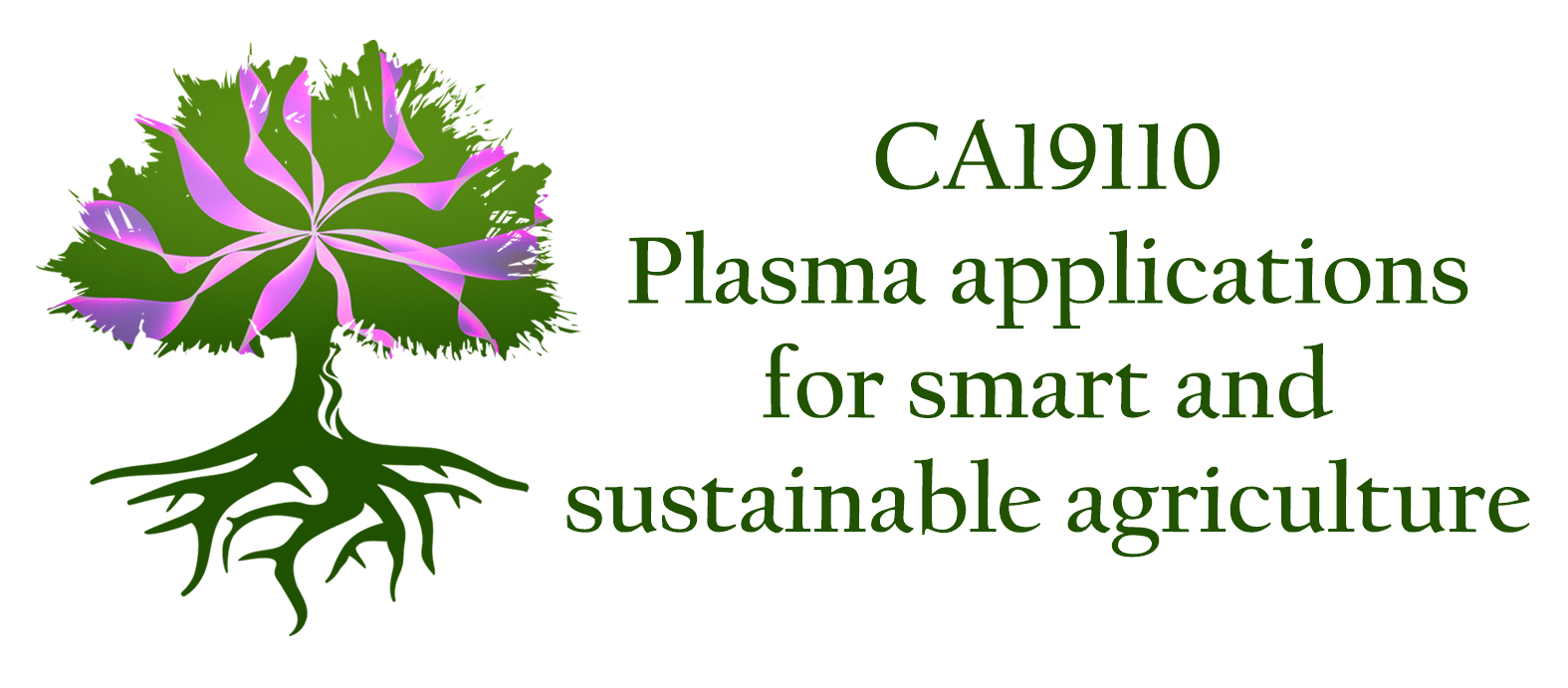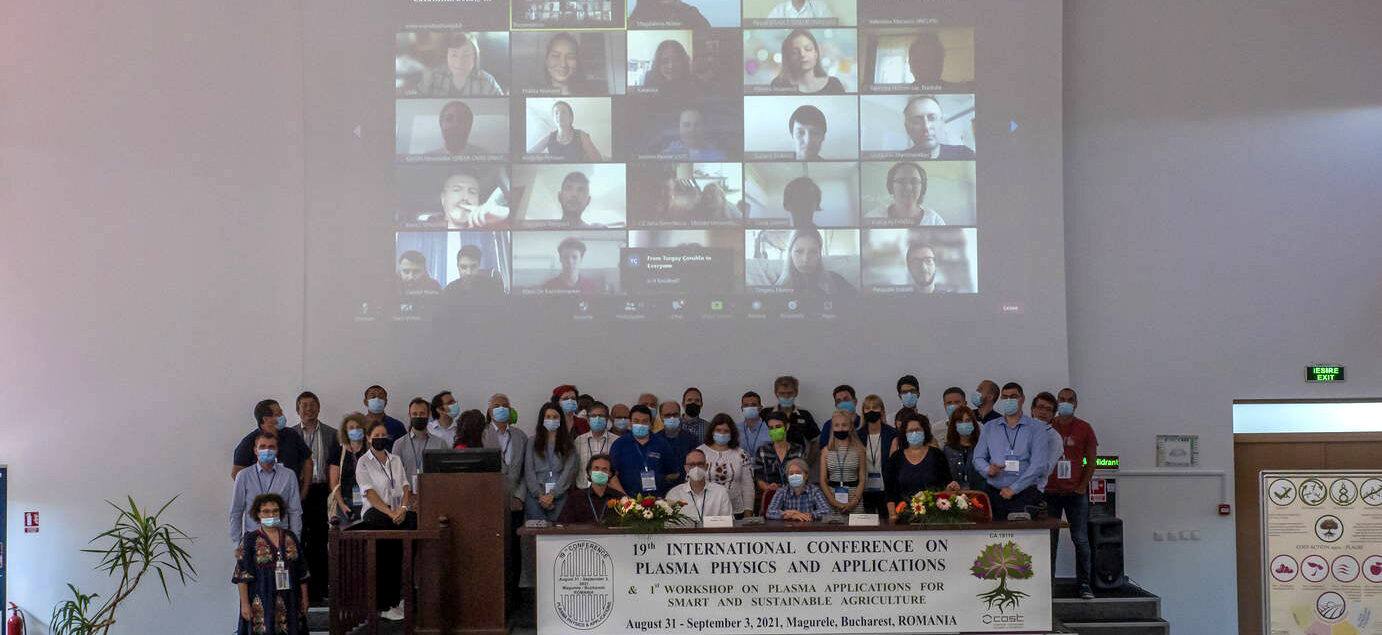1st Workshop on Plasma Applications for Smart and Sustainable Agriculture
The first Workshop of the COST Action CA 19110 – Plasma applications for smart and sustainable agriculture took place in the periods 2-3 September 2021 in Magurele, Bucharest. It followed all the four directions of the Action CA 19110, coordinated by Dr Nevena Puać, Institute of Physics, Belgrade, Serbia, dedicated to research in the fields of i) low-temperature plasma treatment of seeds, ii) plants and soil, iii) plasma treatment of agricultural wastewater, culture media and manure, as well as in the field of plasma-activated water production, and iv) in the field of applications of plasma processes and technologies in the food industry. The workshop, chaired by CS I Dr Bogdana Mitu, INFLPR, Romania, illustrated the synergy between researchers from across Europe with expertise in plasma physics, chemistry, biology, agricultural and food sciences, as well as engineering, which leads to innovative solutions in solving pressing problems facing humanity at this time.
The organization of the Workshop was ensured by the International Scientific Committee and Local Organizing Committee, as well as by the scientific secretary S. D. Stoica (INFLPR, Bucharest).
International Scientific Committee
- Wolfgang Gernjak, Girona (ES)
- Matteo Gherardi, Bologna, (IT)
- Frantisek Krčma, Brno (CZ)
- Kinga Kutasi, Budapest, (HU)
- M. Măgureanu, Bucharest (RO)
- Anton Nikiforov, Gent, (BE)
- Joanna Pawłat, Lublin (PL)
- Gregor Primc, Ljubljana (SI)
- Nevena Puać, Belgrade (RS)L
Local Organizing Committee
- F. Bîlea, Bucharest
- C. Bradu, Bucharest
- L. G. Carpen, Bucharest
- C. Chireceanu, Bucharest
- M. Gîdea, Bucharest
- I. Topală, Iasi
The workshop was hosting 8 invited lectures, selected by the Scientific Committee, 6 oral presentations and 10 poster presentations, during the 2nd and 3rd of September.
An overview of the invited lectures, associated with the CA 19110 Action, is presented below, while here, you can download the book of abstracts.
Topic 1 – Low-temperature plasma treatment of seeds
Dr Thierry Dufour of the Sorbonne University, Paris, France, presented results on the potential of using plasma to improve seed germination parameters, such as vigour and germination rate, but also to reduce the load of pathogens. Prof. Vida Mildaziene, from Vytautas Magnus University, Kaunas, Lithuania, illustrated the molecular changes induced in dried or germinating seeds and growing plants following cold plasma treatment. They showed that the beneficial effects of plasma treatment are found throughout the vegetation of the studied plants, resulting in increased production yields due to changes in their metabolism.
Topic 2 – Low-temperature plasma treatment of plants and soils
An extremely important aspect resulting from the work of the workshop was that of the efficiency of using Plasma-Activated Water (PAW) for the treatment of infected plants. Relevant examples were provided by Prof. Assunta Bertaccinini from the University of Bologna, Italy, on the applicability of activated water to the treatment of Solanum Lycopersicum (tomatoes) experimentally inoculated with Xanthomonas vesicatoria (Xv), as well as of infected vine plants, whose healing was pursued both in the greenhouse and in the vineyard. The results indicate the potential of plasma technologies in the treatment of plants without pesticides or other toxic agents, based on plasma-activated water. This PAW water contains hydrogen peroxide (H2O2), nitrites (NO2–) and/or nitrites (NO3–), formed as a result of the interactions of reactive species in plasma containing oxygen and nitrogen (RONS), with the liquid. Dr Henrike Brust of the Leibniz Institute for Plasma Science and Technology, Germany, presented extensive research on the response of Lupinus angustifolius L. proteins responsible for primary metabolism and growth regulation, as well as secondary metabolism and response to abiotic stress, as an illustration. of the physiological mechanisms that affect the developmental processes and stress responses of the whole plant.
Topic 3 – Plasma treatment of agricultural wastewater, growth media, manure and production of plasma-activated water (PAW)
The use of activated plasma water as a watering agent proved to be an excellent solution to stimulate growth and improve production in pea and corn crops, illustrating the research of the group led by Prof. Zdenko Machala, from Comenius University, Bratislava, Slovakia. An extremely important aspect addressed during the conference and workshop was related to the decontamination of wastewater, the particular case of poly- and perfluoroalkyls and pesticides being discussed in the workshop of Prof. Ester Marotta, from the University of Padova, Italy. Studies have provided a comprehensive picture of the complex plasma-induced chemistry associated with these innovative de-pollution systems.
Topic 4 – Applications of plasma processes and technologies in the food industry
Prof. Oliver Schlüter of the Leibniz Institute for Agricultural Engineering and Bioeconomy, Germany, gave a guest lecture illustrating the potential and limitations of plasma technologies in the food sector, aiming to increase the shelf life of food by targeted inactivation of microorganisms and personalization of food attributes. quality along the entire food value chain. Considering the maturing level of knowledge of plasma decontamination processes, Prof. Paula Bourke of University College Dublin, Ireland, proposed a large-scale approach to atmospheric pressure plasma technologies in the food processing sector to develop industrial prototypes in cooperation with industry stakeholders. Although carried out in pandemic conditions, the Workshop enjoyed a wide audience, provided both by the physical participants in the conference and by those in the online environment, accumulating daily between 110 and 140 researchers, professors, doctoral students, master students, students from the country and abroad. The contributions were included as a separate part of the Book of abstracts of the 19th International Conference on Plasma Physics and Applications (Book of Abstracts: ISSN 2344-0481 / ISSN-L 2344-0481) which is available online on the website events, at https://cppa2021.inflpr.ro/.

